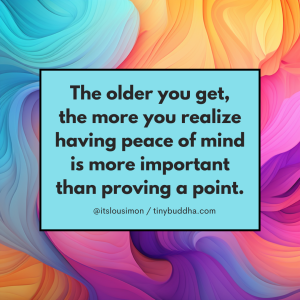
“Peace cannot be kept by force. It can only be achieved by understanding.” ~ Albert Einstein
An anxious mind is a hard burden to bear. In fact, if you suffer from an anxious mind it can truly feel like a curse.
The racing thoughts. The daily tirade of “what ifs.” The relentless voice of your inner critic constantly nagging you and deriding your every move.
And the worst part is that the mental chatter feels uncontrollable. Truly, there were times when I struggled in vain to quiet my mind.
It was like there was some hub or center in my brain that had gone haywire, flipped into overdrive, and couldn’t be switched off.
I used to despair a lot over my unquiet mind. Even the great spiritual masters struggled to achieve mastery over their minds, so how could I?
I read a lot about mindfulness and tried some mental mastery techniques like the Sedona Method and Emotional Freedom Technique. I meditated. These techniques helped, but the results would only last for a short time; the underlying issues driving my anxiety persisted and whatever peace I got would be short-lived.
I eventually realized that if I was to quiet my chatterbox mind I would have to stop trying to control my mind and focus instead on letting my anxiety teach me what it wanted to teach me.
I started keeping a dream journal (I had many of the typical anxiety dreams). I also started to get real with myself, sitting still with my anxious thoughts whenever they occurred and letting myself be receptive to what they were trying to show me.
I went from trying to control and resist my anxious thoughts to the deeper place of understanding their underlying message and inherent wisdom. Here’s what I discovered.
An anxious mind can be caused by:
1. Unresolved relationship issues
It turns out an anxious mind can be caused by unresolved issues in our interpersonal relationships. The anger, jealousy, regret, or unspoken feelings (positive or negative) that we harbor toward people lives on in our subconscious minds, undermining our inner peace. This is true even when we are not around those people or consciously focusing on them.
For me, I had spent many years silently harboring anger toward my mother and father for perceived failures as parents. I was also holding on to an infatuation with a former flame that I hadn’t seen in years, and was still mentally “tuned into” negative relationship dynamics from as far back as my high school years.
As I began to face up to these unresolved relational issues, releasing people from my heart’s tribunal, my anxiety decreased to a surprising extent. I literally felt like I could breathe easier.
2. Unexpressed gifts or desires
Anxious thoughts can be the result of unexpressed gifts, especially if the thoughts center around your career or how you spend your free time. In this way, anxiety is a manifestation of inner guidance.
There is some gift or higher aspect of who you are that wants and needs to be expressed, but that has been denied expression because of fear.
Psychologists have figured out that human beings have an inherent drive for self-actualization—to fulfill our individual potential. When there are obstructions to self-actualization, anxiety takes root.
In ancient times, prophets often spoke of the urge to prophesy as being like a “fire shut up in their bones.”
Anxiety is like this―a bottled-up feeling of having something inside of you that you long to express. The gift, desire, or calling within that longs for expression is bigger than you; it is tied up with your purpose for existing, which is why it feels so painful when it is suppressed.
For me, my anxiety was telling me that I had a gift for using words and expressing myself through writing that I wasn’t cultivating enough. I also had leadership abilities and a yearning for spiritual development that I was ignoring.
It could be latent artistic gifts, the secret desire to adopt a child, or a pull toward motivational speaking. Whatever it is, learning to express it will work wonders for your anxiety.
3. Guilt
Guilt is the emotional and cognitive state we experience when we feel we have done something wrong. We may have violated our own moral code or expectations, or those of others, or we may simply think that we have done something wrong even when we haven’t.
Whatever the case, we feel judged (or we judge ourselves harshly and unforgivingly) for our actions, thoughts, or simply for being who we are.
And because it’s so hard to express guilt (it’s not like anger where you can punch some pillows), guilt is often an internalized emotion, commonly referred to as a “bothered conscience.” Guilt sinks deep into our subconscious and manifests as anxious thoughts―it’s like our inner critic on heroin.
At one time I harbored a lot of guilt over old friendships I had broken off. I had broken off those friendships because they were limiting my growth yet I still felt like I had violated my own standards of what it meant to be a good friend, hence the guilt.
I walked around for years with a lot of anxiety because my guilt-tripped inner critic was always telling me that I hadn’t been a good friend in the past and never would be.
I would feel guilty if I was anything less than the perfect, always-available, always-upbeat friend, and the fear that I wasn’t a good friend made me anxious about forming new friendships. I was always worried that I was doomed to mess up my friendships.
It was only by examining my guilt more closely that I came to understand that my standards of being a good friend were irrational; after all, people change, it’s okay to move on, and you don’t have to be a perfect person to be a good friend.
So our guilt is often irrational or out of proportion with what’s really at stake. And even if you feel your guilt is justified, remember everyone makes mistakes.
You deserve self-compassion. So embrace it and put your anxious mind at ease!
About Summer Edward
Summer Edward is a Philadelphia-based writer, poet, and children's literature specialist. She holds a Bachelors degree in Psychology and an M.S.Ed. degree in Reading, Writing, Literacy from the University of Pennsylvania and is the recipient of a Roothbert Fellowship awarded to people motivated in their life's work by spiritual values. She blogs at www.summeredward.com.













 Though I run this site, it is not mine. It's ours. It's not about me. It's about us. Your stories and your wisdom are just as meaningful as mine.
Though I run this site, it is not mine. It's ours. It's not about me. It's about us. Your stories and your wisdom are just as meaningful as mine. 